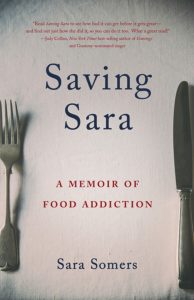FOR IMMEDIATE RELEASE:
“A riveting and deeply human memoir.”
– Anne Lamott, California Hall of Fame inductee, novelist, and nonfiction writer
 PARIS – For nearly fifty years, Sara Somers suffered from untreated food addiction. In “Saving Sara” (She Writes Press, May 12, 2020) Somers’ intimate memoir, she offers readers an inside view of a food addict’s mind, showcasing her experiences with obsessive cravings, compulsivity, and powerlessness regarding food, with the hopes of educating her readers and promoting life-saving conversations between loved ones and those suffering with addiction.
PARIS – For nearly fifty years, Sara Somers suffered from untreated food addiction. In “Saving Sara” (She Writes Press, May 12, 2020) Somers’ intimate memoir, she offers readers an inside view of a food addict’s mind, showcasing her experiences with obsessive cravings, compulsivity, and powerlessness regarding food, with the hopes of educating her readers and promoting life-saving conversations between loved ones and those suffering with addiction.
“Saving Sara” chronicles Somers’s addiction from childhood to adulthood, beginning with abnormal eating as a nine-year-old. As her addiction progresses in young adulthood, she becomes isolated, masking her shame and self-hatred with drugs and alcohol. Time and again, she rationalizes why this time will be different, only to have her physical cravings lead to ever-worse binges, to see her promises of doing things differently next time broken, and to experience the amnesia that she –like every addict– experiences when her obsession sets in again.
Even after Somers is introduced to the solution that will eventually end up saving her, the strength of her addiction won’t allow her to accept her disease. Twenty-six more years pass until she finally finds her way back to that solution.
A raw account of Somers’ decades-long journey, “Saving Sara” underscores the challenges faced by food addicts of any age – and the hope that exists for them all.
“Read Saving Sara to see how bad [addiction] can get before it gets great – and find out just how she did it, so you can do it too. What a great read!”
– Judy Collins, New York Times bestselling author of Cravings
 SARA SOMERS suffered from food addiction from age nine to age fifty-eight; she has been in food recovery since 2005. In a double life of sorts, Somers worked as a licensed psychotherapist in the San Francisco Bay Area for thirty-four years. After finding recovery, Somers moved to Paris, France, where she currently lives. She writes a blog called Out My Window: My Life in Paris. When she’s not writing, Somers volunteers at the American Library in Paris, enjoys the cinema, reads prolifically, and follows her favorite baseball team, the Oakland Athletics. Most importantly, Somers devotes time each day to getting the word out about food addiction and helping other food addicts. “Saving Sara” is her first book. To learn more about Sara and her work, visit www.saving-sara.org.
SARA SOMERS suffered from food addiction from age nine to age fifty-eight; she has been in food recovery since 2005. In a double life of sorts, Somers worked as a licensed psychotherapist in the San Francisco Bay Area for thirty-four years. After finding recovery, Somers moved to Paris, France, where she currently lives. She writes a blog called Out My Window: My Life in Paris. When she’s not writing, Somers volunteers at the American Library in Paris, enjoys the cinema, reads prolifically, and follows her favorite baseball team, the Oakland Athletics. Most importantly, Somers devotes time each day to getting the word out about food addiction and helping other food addicts. “Saving Sara” is her first book. To learn more about Sara and her work, visit www.saving-sara.org.
“Saving Sara: A Memoir of Food Addiction”
Sara Somers | May 12, 2020 | She Writes Press
Paperback ISBN: 9781631528460 | Price: $16.95
Memoir
In an interview, SARA SOMERS can discuss:
- Why she decided to chronicle her experiences with addiction into a memoir, and how personal stories can be used to educate and heal others
- Why food addiction is often viewed differently from other addictions, and whether she would like to change the perception of food addiction
- What the symptoms of food addiction are, and why they may go unnoticed
- How those who haven’t suffered from addiction can support and stand in solidarity with those who have
An Interview with SARA SOMERS
1. You’ve written a powerful and evocative book detailing your experiences with food addiction. When did you know you needed to write your story? Did you always have in mind that you would share this book with the world?
I learned from my experience in 12 Step programs that telling my story is not only very healing for me, it also helps others who are in trouble to identify with me, and learn about a solution to their problem. Most addicts of any kind will only listen to others’ input when they believe their addiction is understood. I never planned on writing a memoir. Friends read my story and encouraged me to share it with the world. Those of us in recovery from food addiction want word of the solution to get out.
2. Although your memoir presents your personal and individual journey with food addiction, what general truths about the disease can readers learn from “Saving Sara”? Are there any myths about food addiction that you hope to dispel?
The first truth about food addiction I want to stress is that it is an addiction. People like me are told all our lives to just muster up some will power, eat less, exercise more, and all will be well. Even after spending thousands and thousands of dollars on diets and therapists, without success, we keep chasing that myth. Binge Eating Disorder, Bulimia, and Anorexia are all described in
the DSM-V as eating disorders. With little doubt left about the problem, another truth is that there is a lot of disagreement about the solution.
Designers of diets perpetuate the myth that the solution to being fat and to binging is easy for everyone. For most people who are addicted to food, the solution is not easy. If a food addict wants to take the weight off and keep it off, that person likely has to make major life changes, for example, behaving differently in response to emotional pain and stress, and thinking differently
about their relationships in the world. Without these changes, they will go back to binging when the first significant challenge comes their way. To make these changes, most food addicts need to get into some sort of recovery program.
3. What effect do you hope your memoir has on readers? What would you like for them to take away from the book?
I want to offer a solution to a number of different audiences, starting with bingers who are still suffering and don’t realize there is a solution, and bingers who have found the solution but still treat it like a diet. I want to reach the bingers’ family members, who feel helpless and powerless. I also want to reach medical professionals, including psychotherapists and people working in the field of addiction. I want the people who want to help the addict to know they can send their loved one to the experts on ending the binge-eating cycle: recovering food addicts themselves.
4. In addition to sharing your personal stories, you’re also taking on other projects and means for helping those suffering with food addiction. Can you speak a little bit to what you’re doing? If a reader also wants to take action and stand in solidarity with those suffering, how would you recommend they do so?
Although it’s not a “project,” I do as much service as I can in GreySheeters Anonymous, which is the particular 12 Step Program that I belong to. I want to help this program grow and attract more and more people.
I will also be writing a blog about binging and eating disorders, addressing questions that readers have, but I want to stress that I can only tell my story and my experience.
Any readers, whether those with food addiction or those who love them, can visit an “Open” meeting of most Anonymous programs. There they will hear the stories that are devastating as well as the stories of recovery. They will hear the joy of coming back from a certain death. They will gain a better understanding of addiction and recovery.
5. Do you currently have plans to continue writing? If so, what can readers expect to see from you in the future?
As I mentioned, I will write a blog that addresses questions that readers have. And already people are asking me to write more about my recovery. That is always a possibility! But I want to stress that this book is just one person’s story of food addiction and recovery. The real ‘star’ is the solution to the misery and hell of food addiction: Greysheeters Anonymous. My writing about recovery will always focus on my experiences in this life-saving program.

A former award-winning journalist with national exposure, Marissa now oversees the day-to-day operation of the Books Forward author branding and book marketing firm, along with our indie publishing support sister company Books Fluent.
Born and bred in Louisiana, currently living in New Orleans, she has lived and developed a strong base for our company and authors in Chicago and Nashville. Her journalism work has appeared in USA Today, National Geographic and other major publications. She is now interviewed by media on best practices for book marketing.
